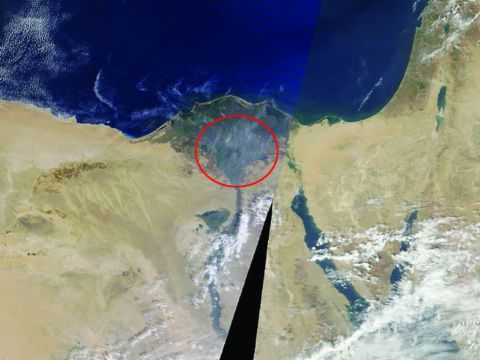
(AFP Photo)
During their seven months in power, former Prime Minister Hazem El-Beblawi and his cabinet failed to answer Egypt’s economic woes and fix fiscal challenges, experts say.
El-Beblawi’s government directed a large portion of its economic stimulus packages to infrastructure projects, such as factories, roads and residential units, in an attempt to increase the “supply” of the market, said Fakhry El-Feky, an economy professor at Cairo University. The government however failed to stimulate the market’s “demand” such as boosting the fund, he said.
The former interim cabinet adopted two economic stimulus packages, each valued at around EGP 30bn, aimed at creating a 3% growth rate over the current fiscal year and reining in the 13.8% GDP budget deficit to 10%. Former Finance Minister Ahmed Galal described both packages as “pivotal” to supporting the economy and private sector growth.
But because of a low supply of foreign currency, the market has remained in a “slump”, El-Feky said. Egypt’s net international reserves rose in January for the first time since last August, to record $17.105bn. At the end of August, foreign reserves had stood at $18.916bn.
“A great numbers of factories are still closing because investors are unsure whether people will buy their products or not,” he said.
In hopes of spurring economic growth, El-Beblawi’s government followed an expansionary economic policy, Galal said. The new interim government, headed by Prime Minister Ibrahim Mehleb, however, is expected to adopt an austerity policy in order to “balance” the market, El-Feky said.
Mehleb’s government should focus on “structural reforms”, such as increasing the number of people who qualify for the minimum income system, increasing the value of the social security pensions and providing unemployment benefits for the jobless, El-Feky said.
The minimum income system, which guarantees workers EGP 1,200 a month, applies only to employees who work in the ministries, government localities and service authorities, according to the Ministry of Finance. The selective application sparked strikes in February across a number of public sectors, including the Public Transportation Authority.
Banking and economic expert Bassant Fahmy said the new cabinet should also focus on implementing the maximum income system “which was set but not applied”. The maximum wage law, originally set to kick off in January 2014, would cap wages for public employees at 35 times the minimum wage, or EGP 42,000. Galal’s ministry could have saved a significant amount if it had rationed its spending on the “high salaries” of ministers’ advisers, he said.
El-Feky said the government also needs to devise a plan to address the country’s energy crisis.
Before El-Beblawi’s government announced its resignation on 24 February, Minister of Planning Ashraf El-Araby expressed the government’s intention to increase the public awareness of the energy subsidies issue and the negative effect of its current form. The interim government “gradually” began an energy subsidies programme that allows citizens to access fuel and electricity at low prices before leaving office. A total amount of EGP 128bn is spent by the state on energy subsidies.
“The current government should also announce a timeframe for implementing its economic plans,” El-Feky said, urging the government to reveal a plan for trimming the budget deficit.
In December, Galal said the government has the resources to reduce the budget deficit by the end of the current fiscal year. “But we want to guarantee that it will not grow in the years after,” he said.



